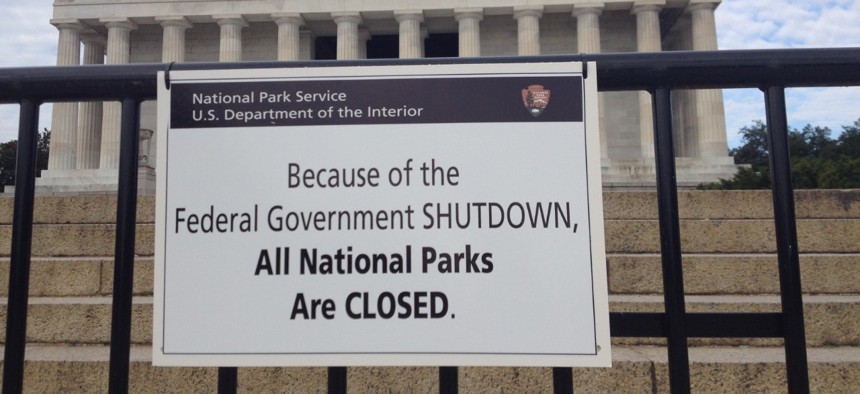
Flickr user NPCA Photos
Federal Judge Dismisses Shutdown Lawsuit
A federal employee union had argued that forcing federal employees to work without pay during a lapse in appropriations constitutes a violation of the Anti-Deficiency Act, but a judge on Monday ruled that with the government open, the case is now moot.
A federal judge on Monday dismissed a lawsuit brought by the National Treasury Employees Union and another group of federal workers challenging the legal basis by which the federal government forces employees to work without pay during shutdowns, finding that the case is now moot.
During the 2019 partial government shutdown, NTEU sued President Trump, arguing that agencies’ expansion of the definition of essential services exempt from shutting down due to a lapse in appropriations was unconstitutional and violated the Anti-Deficiency Act. But after the government reopened, the Trump administration asked U.S. District Judge Richard Leon to dismiss the case.
In oral arguments on the government’s motion to dismiss, the union argued that the case was capable of repetition, yet evading review, a legal exception for plaintiffs for whom a legal injury is likely to reoccur, but for too short a period of time for the court to meaningfully consider their case.
But attorneys from the Justice Department, representing the administration, said NTEU must prove that a future lapse in appropriations would closely mirror the 2018 shutdown. “In order to conclude plaintiffs will face the same harm in the future, I would have to assume a shutdown will occur, the same agencies will be affected, those agencies will react the same way again, and those agency decisions will affect the same plaintiffs,” Leon wrote In an 18-page decision. “[That] chain of political events is simply ‘too long to credit.’ ”
Leon also rejected NTEU’s argument that only the alleged legal injury needed to be replicable, rather than all relevant characteristics.
“In plaintiffs’ view, because another shutdown is likely to occur at some point in the future, their claims are capable of repetition; the other contingencies identified above are simply underlying facts or characteristics of their legal challenge that are irrelevant to the capable-of-repetition analysis,” he wrote. “Plaintiffs are wrong. It is not enough for a court to simply conclude that another shutdown may occur in the future. Plaintiffs must also establish that the other contingencies inherent in some future budgetary dispute between the two political branches are reasonably likely to recur.”
In a statement, NTEU National President Tony Reardon indicated the union will appeal the ruling.
“NTEU’s lawsuit is not moot because, regrettably, further shutdowns are certainly capable of being repeated,” Reardon said. “Shutdowns are terribly unfair for hard working federal employees who are sent home without pay or are forced to work without pay. NTEU believes that a court should review the important question of whether such shutdowns, which will certainly happen again, are consistent with law.”
Although he ruled in favor of the government, Leon indicated that he disapproved of the government’s actions that led to the lawsuit in the first place, particularly the Internal Revenue Service’s decision to recall thousands of employees to work without pay to process tax returns.
“The record clearly suggests that that decision was made to avoid the anticipated political heat that would have no doubt been generated as to both executive and legislative officeholders had the shutdown caused delays in the disbursement of taxpayer refunds,” Leon wrote. “Not surprisingly, Congress has taken no remedial action in response to date, despite the IRS’s dubious claim that those employees were somehow necessary for ‘the safety of human life or the protection of property.’ Fortunately for the government, however, not every self-serving transmogrification of the law can be righted by the courts.”







